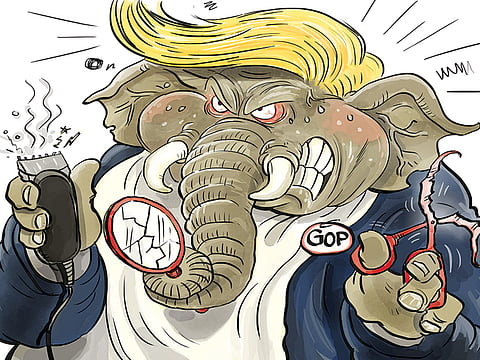Trump isn’t going away
He is unlikely to win GOP nomination, but his presence will force more serious candidates to respond to his outlandish views

What is one to make of Donald Trump, the real estate magnate and reality-TV star turned Republican US presidential candidate?
Virtually no one, perhaps not even Trump himself, believes he can win the GOP nomination, let alone the presidency. Every public statement he makes provides fodder for comedians and provokes eye-rolls in newsrooms around the country — even as TV channels rush to give him air time (print outlets have been less accommodating, but that is perhaps understandable: If Trump is anything he is a creature of television). The paradox of the Trump candidacy is that few journalists or politicos will admit to taking him seriously — even though many of these same people act in ways that indicate they do.
For the moment, he leads the Republican field in opinion polls. In some ways that is less impressive than it sounds. There are 17 announced Republican candidates, so the 18 per cent Trump polled last week in a Fox News survey was enough to put him in first place. There has long been a presumption among political types that numbers like that are based mainly on name-recognition and probably represent a ceiling for Trump’s support. There is a certain logic to that, but until the field narrows there is no way to test it in practice.
Combine this with Trump’s belligerent public persona and the conventional wisdom has always been that he could not last long in the crucible of electoral politics. He has spent the weeks since formally announcing his candidacy refusing to apologise for (and, indeed, frequently repeating) comments that seemed to brand all immigrants from Mexico as rapists and claiming that as president, he will build a huge wall along the border and force Mexico to pay for it. Over the weekend, he caused a new firestorm by questioning whether John McCain’s five-and-a-half years in a Vietnamese prison really qualified him as a war hero.
Comments like these would have ended the career of any ordinary politician. For Trump, they were pretty much standard operating procedure. For more than a decade, he has regularly gone on radio and TV to insult or belittle anyone who speaks ill of him. So when McCain criticised Trump’s position on immigration Trump did what he always does: Respond with a louder, nastier insult.
This habit of responding with ever more belligerent trash talk has served Trump well because it mirrors the larger popular culture. From professional sports to TV’s Food Network the lesson far too many Americans take from movies, TV and music is that the only way to respond to any slight or challenge, real or perceived, is to lash out in return. Trump is a living, breathing monument to this way of thinking and acting. Add to that the very American belief that making a lot of money must mean one is smart and his appeal is less difficult to understand.
Translated into the world of politics this has made Trump the perfect candidate for a certain type of voter. If Fox News has come to be seen as the voice of angry disaffected White Americans then more than any single figure in public life Trump, a frequent Fox guest long before he started running for president, is the distilled embodiment of what most people imagine the typical Fox viewer to be.
None of that will win him the Republican Party’s nomination and it certainly will not make him president. It will, however, keep him in the race for months to come and will increasingly force more serious candidates to respond to his outlandish statements. This is precisely what the GOP establishment fears. It has spent four years trying to avoid a repetition of 2012, when extreme candidates pulled the party and its eventual nominee, Mitt Romney, unelectably far to the right during the primaries. But over the last four years, the party’s base has moved even further right, something the current crop of candidates (not just Trump) clearly understand to judge by their rhetoric.
What Trump does is guarantee that the angry right will have a loud, well-financed voice for as long as he wants to continue spending his own money. There has been a certain amount of media silliness over the last few weeks about the exact extent of Trump’s wealth. He claims a fortune exceeding $10 billion (Dh36.78 billion). Others estimate it at around $4 billion. This debate misses the key point: However one defines it, Trump is correct when he calls himself “really, really rich”. In any case, he does not seem to be investing much cash in his campaign so far. Interviews and the subsequent news coverage they generate are his main campaign activities, and these cost him nothing.
That means that Trump will be with American voters, for a while at least, offering the GOP base the political equivalent of junk food: Immediately satisfying, but, in the long run, very bad for you indeed — and a hard habit to break.
Gordon Robison, a longtime Middle East journalist and US political analyst, teaches political science at the University of Vermont.


